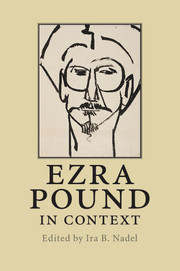Book contents
- Frontmatter
- Contents
- Notes on contributors
- Acknowledgements
- Chronology
- List of abbreviations and note on references to The Cantos
- Introduction
- Part I Biography and works
- Part II Historical and cultural context
- 16 The classics
- 17 Provençal and the troubadours
- 18 Dante and early Italian poetry
- 19 America
- 20 Venice
- 21 London
- 22 Paris
- 23 Rapallo and Rome
- 24 Pisa
- 25 Imagism
- 26 Vorticism
- 27 Music
- 28 Visual arts
- 29 Confucius
- 30 The Orient
- 31 Little magazines
- 32 Publishing and publishers
- 33 Modernism
- 34 Fascism
- 35 Anti-Semitism
- 36 Gender and sexuality
- 37 Race
- 38 Travel
- Part III Critical reception
- Further reading
- Index
37 - Race
Published online by Cambridge University Press: 05 July 2014
- Frontmatter
- Contents
- Notes on contributors
- Acknowledgements
- Chronology
- List of abbreviations and note on references to The Cantos
- Introduction
- Part I Biography and works
- Part II Historical and cultural context
- 16 The classics
- 17 Provençal and the troubadours
- 18 Dante and early Italian poetry
- 19 America
- 20 Venice
- 21 London
- 22 Paris
- 23 Rapallo and Rome
- 24 Pisa
- 25 Imagism
- 26 Vorticism
- 27 Music
- 28 Visual arts
- 29 Confucius
- 30 The Orient
- 31 Little magazines
- 32 Publishing and publishers
- 33 Modernism
- 34 Fascism
- 35 Anti-Semitism
- 36 Gender and sexuality
- 37 Race
- 38 Travel
- Part III Critical reception
- Further reading
- Index
Summary
In February of 1952, from his room in St. Elizabeths mental hospital, Ezra Pound wrote to his old friend Olivia Rossetti Agresti – niece of poet Dante Gabriel Rossetti, one-time editor of the fin-de-siècle anarchist journal The Torch, and latterly – like Pound – an ardent supporter of Mussolini. But neither anarchism nor fascism was on the table at this moment; the question was race and culture:
Eropewns will nebber understan’ deh Kullud race / marse blackman will most certainly not return to Africa to infect what the dirty brits have left there / with any more occidental hogwash / He will stay here…being human and refusing to be poured into a mould and cut to the stinckging patter[n] on the slicks and the weakly papers. An occasional upsurge of African agricultural heritage as in G. W. Carver, o.kay but also marse Blakman him lazy / lazy as Lin Yu Tang. thank god for it / as a humanizing element most needed here / tho yr beloved kikes try to utilize him for purposes of demoralization / hell / he ain’ nebber been moralized / thank God.
Since the mid 1980s, scholars have been combing Pound's voluminous correspondence for this kind of pronouncement and have not surprisingly discovered the racism they expected. Indeed, Pound proves to have been as obsessed with race as everyone else in America.
- Type
- Chapter
- Information
- Ezra Pound in Context , pp. 412 - 423Publisher: Cambridge University PressPrint publication year: 2010

